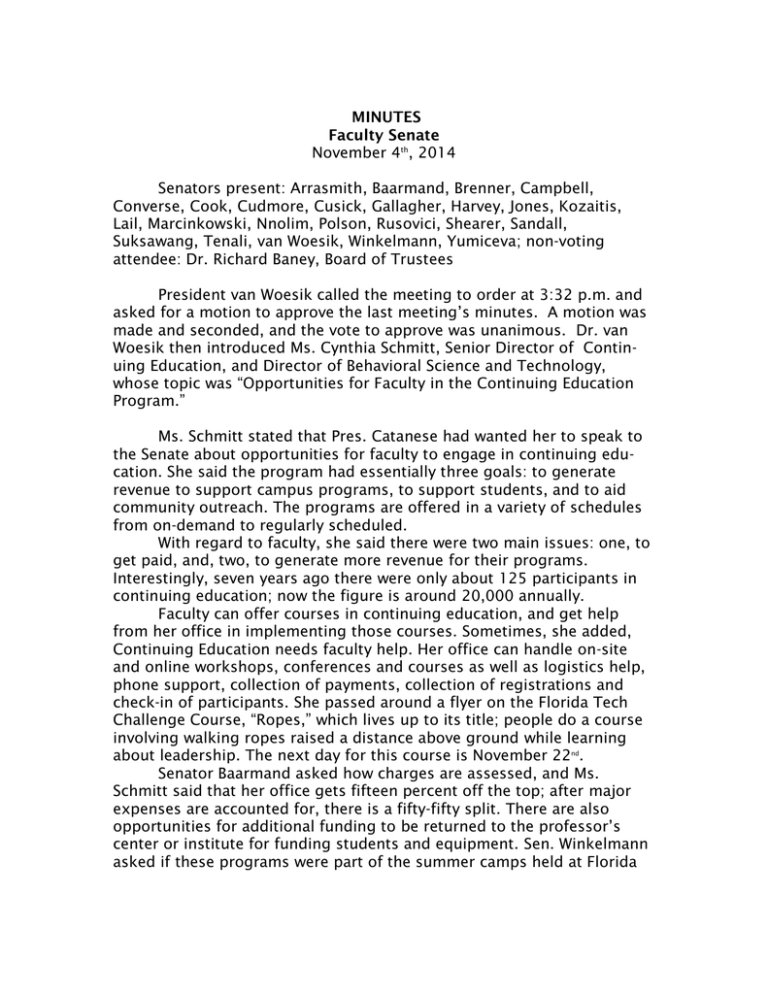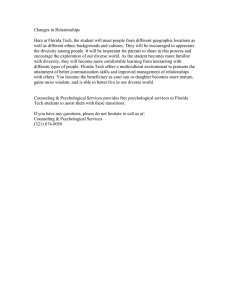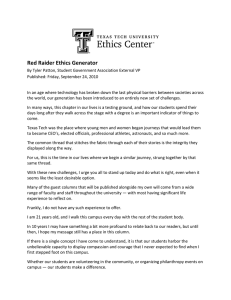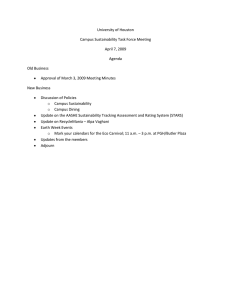November 2014 Minutes #105
advertisement

MINUTES Faculty Senate November 4th, 2014 Senators present: Arrasmith, Baarmand, Brenner, Campbell, Converse, Cook, Cudmore, Cusick, Gallagher, Harvey, Jones, Kozaitis, Lail, Marcinkowski, Nnolim, Polson, Rusovici, Shearer, Sandall, Suksawang, Tenali, van Woesik, Winkelmann, Yumiceva; non-voting attendee: Dr. Richard Baney, Board of Trustees President van Woesik called the meeting to order at 3:32 p.m. and asked for a motion to approve the last meeting’s minutes. A motion was made and seconded, and the vote to approve was unanimous. Dr. van Woesik then introduced Ms. Cynthia Schmitt, Senior Director of Continuing Education, and Director of Behavioral Science and Technology, whose topic was “Opportunities for Faculty in the Continuing Education Program.” Ms. Schmitt stated that Pres. Catanese had wanted her to speak to the Senate about opportunities for faculty to engage in continuing education. She said the program had essentially three goals: to generate revenue to support campus programs, to support students, and to aid community outreach. The programs are offered in a variety of schedules from on-demand to regularly scheduled. With regard to faculty, she said there were two main issues: one, to get paid, and, two, to generate more revenue for their programs. Interestingly, seven years ago there were only about 125 participants in continuing education; now the figure is around 20,000 annually. Faculty can offer courses in continuing education, and get help from her office in implementing those courses. Sometimes, she added, Continuing Education needs faculty help. Her office can handle on-site and online workshops, conferences and courses as well as logistics help, phone support, collection of payments, collection of registrations and check-in of participants. She passed around a flyer on the Florida Tech Challenge Course, “Ropes,” which lives up to its title; people do a course involving walking ropes raised a distance above ground while learning about leadership. The next day for this course is November 22nd. Senator Baarmand asked how charges are assessed, and Ms. Schmitt said that her office gets fifteen percent off the top; after major expenses are accounted for, there is a fifty-fifty split. There are also opportunities for additional funding to be returned to the professor’s center or institute for funding students and equipment. Sen. Winkelmann asked if these programs were part of the summer camps held at Florida Tech; Ms. Schmitt answered that summer camps are a completely separate matter. Continuing Education can offer phone, payment and registration support for summer camps for professors who need administrative assistance and phone support for their summer camps as requested, for a fee of fifteen percent of the collected revenue. Dr. van Woesik asked about faculty recording a course, and Ms. Schmitt responded that the professor who makes the recording owns the copyright to the content, but that negotiation is also possible. President’s Report Pres. van Woesik thanked Ms. Schmitt for her informative report, and moved to the President’s Report. He said he attended the Board of Trustees Academic Affairs Committee on October 16th, chaired by Dr. Richard Baney. Provost McCay announced that there is consideration of a potential merger between our Scott Center for Autism Treatment and the Space Coast Early Intervention Center (SCEIC). This merger could potentially strengthen both programs; however, the Administration is still considering the cost and benefits to both parties, and is working on a detailed business plan that will be presented to the Board of Trustees in January of 2015. Vice President for Academic Affairs Dr. Semen Koksal announced that Florida Tech has a new Human Centered Design Institute, with a new director, Dr. Guy Boy. This institute will be primarily for graduate students and will be independent of other colleges, but will integrate activities and research with all other colleges. Dr. Monica Baloga, Vice President for Institutional Effectiveness and Accreditation, updated the committee on the recently submitted Accreditation Report. Vice President for Research Frank Kinney gave the Research Report for 2014. There is $11 million in research grants; all research contracts were worth $47 million. Ms. Leslie Hielema, Vice President for The Orlando Center of Florida Tech, updated the committee on the Orlando facilities and Orlando opportunities. She has opened dialogue with a number companies in Orlando to determine emerging technologies. Lake Nona is rapidly becoming a biomedical hub. Florida Tech has Valencia College in the Lake Nona area, and will launch an Orlando-area operation, a Women’s Business Center, early next year, after receiving $750,000 in funding from the U.S. Small Business Administration. Trustee Jonathan Zung gave a power-point presentation on “Peer and Aspirant Institutions.” One of the central points of the presentation 2 was to define our peer institutions. Another point was that Florida Tech could aspire to higher incoming Scholastic Assessment Test (SAT) scores. Florida Tech’s Class of 2016 had SAT mid-50% scores between 1040 and 1250. Dean Becker reported on the state of the Nathan M. Bisk College of Business. It has moved from a 5,800 square-foot location on campus to the 22,000 square-foot Babcock Oaks Office Building one mile north of the main Florida Tech campus at 2202 South Babcock Street. Pres. van Woesik reported on the general Board of Trustees meeting on October 17th. He said Pres. Catanese gave a positive presentation about the state of the university, which largely reflected his State of the University address to the faculty on October 8th, 2014. Undergraduate enrollment is up twelve percent, graduate student enrollment is up thirteen percent, and Engineering is down nineteen percent (although, nationally, engineering was down two percent). There will be a new Physician’s Assistance graduate degree at Florida Tech, and there are ongoing negotiations in regard to sharing a law degree program with another university, potentially specializing in intellectual property and technology. Trustees Flammio and Dettmer, in summary, showed evidence that the university is in excellent financial condition. Trustee Proctor spoke on Student Affairs, reporting that student fees were raised, but now there is $200,000 for student activities. The committee is considering a bike hire and a textbook hire program. Pres. van Woesik reported on the President’s Task Force, which met October 27th. Dr. Bob Niebuhr, Senior Vice President for Financial Affairs, and Chief Financial Officer, spoke on enrollment and the enrollment task force, whose mission is to examine the various processes involved in recruiting and admitting new undergraduate and graduate students, and to provide recommendations that will improve enrollment on campus, at Extended Studies, and online. As an action item, the establishment of a full-time Calling Center for recruitment, applications, and enrollment, was proposed. The Calling Center is waiting for budget approval. Assistant Vice President for Student Affairs and Dean of Students Rodney Bowers spoke on the retention improvement task force. Currently, retention is at seventy-six percent; the task force is aiming for at least eighty percent retention. Dr. Baloga briefly discussed the Southern Association of Colleges and Schools (SACS) report, but moved on to the Quality Enhancement Program (QEP). The past QEP is now under the responsibility of the Undergraduate Curriculum Committee. The new QEP theme is internationalization. 3 Dean Mary Beth Kenkel is playing a big role in internationalization of Florida Tech, heading up the Internationalizing Campus Committee (ICC). At our school this year, thirty-two percent of the undergraduate students, and fifty-four percent of the graduate students, are international students. Her committee is continuing with the “Did You Know?” campaign There have been a few recent instances on campus in which students’ cultural expectations have prevented them from performing in class. To remediate at least some of these issues the task force is considering policy, or at least guidelines. Furthermore, there will be staff and faculty training programs in cross-cultural awareness. Training programs for Psychology and Liberal Arts start in early November, and in the spring of 2015 for Aeronautics and Business. Science and Engineering training will occur in fall of 2015. Dr. van Woesik added that he suggested that instead of training, the forum should be “discussion based,” because many of the faculty have international experiences that they can share. The committee is working toward some useful policy on expectations, cultural awareness, tolerance, and U.S. laws, to share cultural threads and commonalities. Dr. Gordon Nelson spoke on summer programs. There are at the moment ninety-one summer programs. There is consideration that the university will provide new summer research scholarships; however, the mechanism for this is not perfectly clear. Questions include whether there will there be student tuition waivers, whether the faculty have to write Research Experience for Undergraduates (REU) type National Science Foundation proposals, with clear deliverables. Through what mechanism will the faculty be compensated for teaching undergraduate summer research, and should new courses be generated? This task force is working on resolving these issues. There is a new organization on campus called the Florida Tech University Sustainability Council (USC). Its co-chairs are Ken Lindeman, Professor, sustainability studies, DEIS (Department of Education and Interdisciplinary Studies); Donn Miller-Kermani, Deputy Chief Operating Officer; and Greg Tsark, Vice President for Facilities and University Architect. Their mission statement: “The University Sustainability Council (USC) will assist coordination of academic and facilities operations efforts to advance best practices in sustainability across the Florida Tech campus.” Their objectives include creating a broad forum of representative staff and faculty members to plan, resource, and implement best practices in sustainability across academic curricula, campus operations and community outreach; assisting development of measurement protocols for campus sustainability systems, including GHG emission inventories and energy management, building performances, 4 recycling, and others; coordinating the development of trans-disciplinary curricula in sustainability studies across all colleges; and increasing our performance in best practices following Princeton Review’s Guide to Green Colleges, Sustainability Tracking and Rating Systems (STARS), LEED (Leadership in Energy and Environmental Design), building rankings and other measures. This ended the President’s Report, and Dr. van Woesik moved to Committee Reports. Committee Reports Sen. Tenali, chair of the Academic Policies Committee, reported he had met with Dr. Layne, Director of Graduate Programs, and requested her to table the Senate-approved resolution – to reassess the flexibility of allowing for an open and closed Ph. D. defense of theses and dissertations – for discussion by the Graduate Council as soon as possible. She has agreed to do so for their meeting in November. Sen. Brenner, head of the Administrative Policies Committee, reported that he will be arranging the online evaluation of administrators. There was no Faculty Senate Scholarship report. Sen. Baarmand, the new chair of the Faculty Excellence Awards Committee, asked the Senate to consider what appeared in the agenda for this meeting: a statement modifying the procedures of making the excellence awards. It read: A procedural change in Faculty Excellence Awards: The Faculty Excellence Award Committee will review the candidate dossiers and select the award nominees following the current standard procedure. The Faculty Senate Executive Committee will discuss the proposed nominees; if they concur, the list of the nominees will then be sent to the office of Vice President for Academic Affairs (VPAA) for review. The VPAA review will only entail an assessment of whether the nominees are in good-employment standing and not whether the nominees professionally merit the award. If a nominee is not in good standing, the person who was ranked second by the Faculty Excellence Award Committee will be nominated for the award, and will then be reviewed accordingly. The public announcement of the final awardees will proceed as before. 5 Sen. Winkelmann questioned whether this new statement was necessary at all: surely the awards committee is justified in awarding any faculty member whose performance in his or her area warrants it, regardless of employment status. There was more discussion of the pros and cons of adopting the measure, with Sen. Marcinkowski suggesting a Sense of the Senate vote be taken. Instead, Pres. van Woesik called for a simple vote on whether the statement needed to be considered. Of the twenty-four senators, eleven were for further consideration of the measure, eight were against considering it further, and five abstained. Sen. Baarmand said he would work on it some more. Sen. Cudmore, heading the Welfare Committee, stated that he thought a person from each college should be on his committee for better campus-wide representation of the needs of the faculty. We need a policy on having one representative from each college, he said. One issue his committee wanted opinions on was the faculty load reports; do the reports allow a real reflection of one’s teaching, research and service across the colleges? Another is the need for clarification of the extent of the rights and benefits provided to emeritus professors; another especially important issue is that of non-renewal (as opposed to dismissal). Finally, while there are rules for the extremes of employment such as promotion and termination, there is no retention policy. In other words, he added, there needs to be a policy that provides guidance for faculty on ways to successfully achieve job retention. As there was no Old Business or New, and five-o’ clock was drawing nigh, the meeting was adjourned at 4:55 p.m. Respectfully submitted, Bob Shearer, Secretary 6


